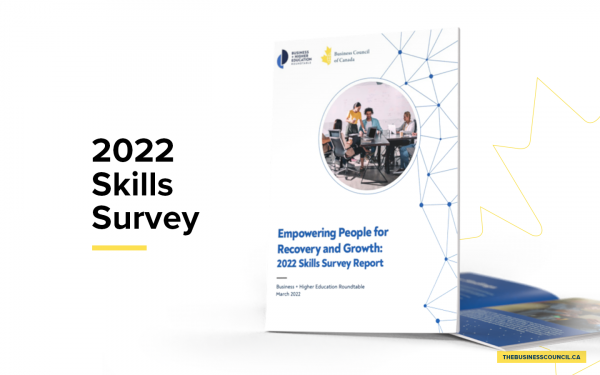Preliminary survey report: the skill needs of major Canadian employers
Introduction
During October and November of 2013, the Canadian Council of Chief Executives (CCCE) surveyed its member companies on their skill needs and human resource priorities. Topics addressed included:
- the skills and attributes that matter most to large Canadian companies when recruiting new employees;
- fields, and regions of the country, in which companies are experiencing skill shortages;
- demographic concerns;
- employer-sponsored education and training initiatives;
- partnerships with post-secondary institutions; and
- companies’ experiences with the immigration system and Canada’s temporary foreign worker program.
More than 100 of the CCCE’s 150 member companies, representing all industrial sectors and regions of the country, participated in the survey – a response rate that clearly underscores the importance of these issues to corporate Canada. In most cases, survey responses were provided by human resource vice-presidents, directors and/or managers.
This brief examines the results of the survey as they relate to recent and future hiring trends, demographic changes, the job market for young Canadians and the skills and attributes that major Canadian companies are looking for when they recruit entry-level employees.
Are CCCE Members Hiring?
Collectively, the companies took part in the survey reported having hired more than 330,000 people over the previous two years. Half of participating companies recruited more than 1,000 people during this period; 22 companies said they had hired more than 3,000 new employees.

Over the next five years, respondents anticipate having to fill between 700,000 and 800,000 positions in Canada. Nearly half expect to fill more than 2,000 jobs. Fourteen companies expect to fill more than 10,000 jobs.
Job opportunities are expected across all sectors, but in particular in financial services, insurance, telecommunications, energy, mining, construction, transport and retail.

These forecasts reflect average rates of employee turnover, expected retirements and anticipated growth. Several respondents acknowledged that their companies’ hiring forecasts are conservative, based on historic hiring rates and, in some cases, expectations for slightly weaker economic growth. It should be noted as well that some companies did not include anticipated hiring by their affiliated companies or franchisees.
Hence, the total anticipated demand for new employees is almost certainly greater than indicated by age range above.
Are Retirements a Concern?
Canada’s aging population is a significant concern for CCCE member companies. Thirty-six percent of the employers that took part in the survey said they expect 11 percent or more of their workforce to retire over the next five years. Eight companies are expecting more than 20 percent of their employees to retire by 2018; one large manufacturing company is anticipating a turnover rate of 50 percent.

While there is concern about the loss of experienced personnel – especially at the executive, project-management, and senior technical levels – nost respondents are “somewhat confident” about their ability to replace the skills of retiring workers. Nearly all companies emphasized their proactive planning efforts, which typically include attrition forecasting, workforce planning, succession planning, leadership training and development, and knowledge transfer.

Respondents also highlighted efforts to develop more robust recruitment and retention programs. Often these efforts are accompanied by strong relationships with post-secondary institutions, focused international recruitment strategies and an emphasis on employee engagement. While respondent companies are for the most part confident about their ability to deal with the impending demographic shift, many are concerned about the human resource capabilities of their sub-contractors and suppliers.
What Does This Mean for Young Canadians?
These results appear positive for recent graduates and other young Canadians who are preparing to enter the labour force. Overall, they suggest that Canada’s largest companies anticipate a rising need for new employees, not only to meet expected growth but also to replace increasing numbers of retiring workers.
This is consistent with the results of a recent survey by BMO Financial Group, which found that a majority of Canadian companies planned to or were hiring students and recent graduates in 2013. Although the average number of job offers per graduate has declined compared with the period before the last recession, employment among those between 20 and 24 years of age has trended moderately higher since the recession and is expected to further increase in 2014.
What are Hiring Managers Looking for?
When asked what attributes matter most when evaluating entry-level hires, respondents tended to emphasize soft skills – also known as non-cognitive skills – over hard skills.
The soft skills most often listed by respondents included people skills and relationshipbuilding, communication skills, problem-solving skills, analytical abilities, and leadership skills.3 As one respondent put it, “Our entry-level employees are expected to gain experience and technical knowledge on the job and through training. However, core competencies such as initiative, communication skills and resourcefulness must be present during the selection process.”

These findings parallel recent results from the 2013 Campus Recruitment and Benchmark Survey Report, sponsored by the Canadian Association of Career Educators and Employers (CACEE). While grades and educational credentials are important, recruiters focus even more on finding people with a strong work ethic, people skills and a willingness to learn. “Attitude always comes first,” said one CCCE survey respondent. “Recruits must be passionate about learning, contributing and fitting into the company’s culture.” In a competitive labour market, applicants who display such qualities are understandably more likely to be hired and, down the road, to be singled out for promotion.
The overall priority placed on soft skills by respondents does not take away from the importance of hard skills and technical training. Forty percent of the companies that took part in the survey indicated that they have difficulties recruiting workers with the right mix of hard skills – roughly as many as said they have challenges finding workers with a good mix of soft skills. Ultimately, the relative importance of soft skills as compared to hard skills depends on the position that the employer is seeking to fill.
Are Employers Looking for Experiences?
Some commentators have voiced concern that employers are looking for more years of work experience than a recent university, polytechnic or college graduate could possibly offer. The “experience-needed syndrome”, as the Harvard Business Review terms it, can be damaging to recent graduates, by limiting their employment opportunities, and to employers, who risk passing up strong candidates if they insist on a certain level of job-related experience.
Participants in the CCCE survey were asked how many years of relevant full-time experience they look for, on average, when filling entry-level jobs. Seventy-two percent said they expect less than two years of experience for such positions; in many cases, there is no requirement at all for experience. In practice many entry-level employees are recruited straight out university, polytechnics or college. One respondent noted that her company “hires approximately 300 students and new graduates each year [who have] little to no experience beyond study.”

Several respondents indicated that co-op programs or other forms of work-integrated learning are important sources of relevant work experience. Indeed, more than threequarters of those surveyed said they hire co-op students through partnerships with one or more colleges, polytechnics or universities. Moreover, many respondents said they plan to expand their co-op programs going forward. This is consistent with the results of a study by the Higher Education Quality Council of Ontario, which found that employers overwhelmingly prefer to hire graduates who gain experience through co-op programs, and consistently offer co-op graduates higher average starting salaries. Co-op programs provide recruiters with more assurance than an applicant has the workforce skills to “hit the ground running.”

Finally, several respondents commented on the importance of summer jobs, part-time work, volunteering and extra-curricular activities when reviewing potential recruits. Those experiences provide valuable material for resumes and are an excellent way to illustrate the development of soft skills.
Are Employers Satisfied with Preparedness of Recent Graduates?
By and large, responding companies said they were satisfied with the preparedness of recent college and university graduates. In part, this may be a product of the intense effort that companies put into finding the best candidates. Large companies, in particular, have the resources to conduct extensive recruitment campaigns, in many cases lasting months, and to out-bid smaller firms for top talent. Increasingly, major employers also have a tendency to recruit from a small number of “partner” schools – post-secondary institutions with which they have an ongoing relationship.

While the majority of respondents indicated that they were satisfied with recent graduates, the survey did raise some developing concerns. In total, more than a quarter of the respondents said they were “neutral” or “dissatisfied” with respect to the preparedness of recent university, polytechnic and college graduates. One large employer noted “a growing and noteworthy difference, or gap, in the quality of students, programs and schools” in the Canadian post-secondary system. Referring to the quality of post-secondary programs across the country, another respondent said “There is a broad spectrum”. She added, “Some [students] are well-equipped and ready for the workplace, even without experience, while others simply cannot contribute yet.”











